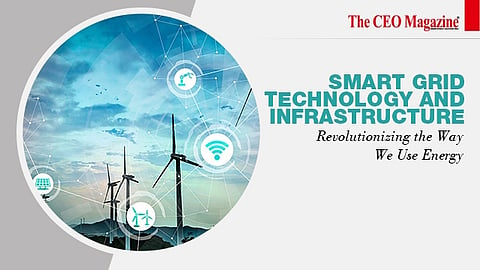
- News
- Women
- Magazine
- IndustryIndustry
- InsightsInsights
- Success Stories
- PublishPublish
- ContactContact
- Media KitMedia Kit

Smart Grid Technology and Infrastructure
The energy industry has undergone significant changes over the past few decades, with an increasing focus on sustainability and renewable energy sources.
Introducing smart grid technology and infrastructure is one of the most exciting developments in this field. This article will provide an overview of smart grid technology and infrastructure, including its functions, benefits, and challenges.
Smart grid technology and infrastructure refer to the use of advanced communication and information technologies to enhance the electricity grid's efficiency, reliability, and sustainability.
Smart grids leverage digital technologies, such as sensors, data analytics, and automation, to monitor and control the flow of electricity, ensuring that energy is delivered to where it is needed most.
Smart grid technology and infrastructure have several key functions, including:
Monitoring and control: Smart grids use sensors and other digital technologies to monitor the flow of electricity in real-time, allowing for more accurate control and optimisation of the grid.
Demand response: Smart grids allow for the implementation of demand response programs, which encourage consumers to reduce their energy consumption during periods of high demand.
Integration of renewable energy: Smart grids enable the integration of renewable energy sources, such as solar and wind power, into the electricity grid, ensuring that these sources are used efficiently and effectively.
Improved reliability: Smart grids are more reliable than traditional grids, with the ability to detect and respond to faults and outages more quickly and efficiently.
Smart grid technology and infrastructure offer several key benefits, including:
Increased energy efficiency: Smart grids enable more efficient energy use, reducing waste and lowering consumer energy bills.
Greater use of renewable energy: Smart grids enable the integration of renewable energy sources, reducing reliance on fossil fuels and contributing to a more sustainable energy future.
Improved reliability and resiliency: Smart grids are more reliable and resilient than traditional ones, reducing the risk of blackouts and ensuring that energy is delivered when needed most.
Cost savings: Smart grids can reduce operational and maintenance costs for energy providers, translating into cost savings for consumers.
Despite the many benefits of smart grid technology and infrastructure, there are also several challenges, including:
Upfront costs: Implementing smart grid technology and infrastructure can be expensive, requiring significant upfront investments in hardware and software.
Cybersecurity risks: Smart grids are vulnerable to cybersecurity threats, requiring robust security measures to protect against attacks.
Integration with legacy infrastructure: Smart grid technology and infrastructure must be integrated with legacy infrastructure, which can be complex and challenging.
Data management: Smart grids generate vast amounts of data, which must be managed and analysed to ensure that the grid operates efficiently and effectively.
Smart grid technology and infrastructure significantly shift how we use and manage energy. By leveraging digital technologies, such as sensors, data analytics, and automation, smart grids enable more efficient, reliable, and sustainable delivery of electricity.
Despite the challenges, the benefits of smart grid technology and infrastructure are clear, including increased energy efficiency, greater use of renewable energy, improved reliability and resiliency, and consumer cost savings.
As the energy industry continues to evolve, smart grid technology and infrastructure will play an increasingly important role in shaping the future of energy.
Follow us on Google News
